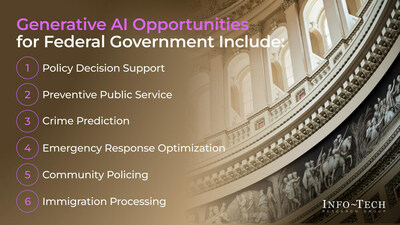New research insights from Info-Tech Research Group explain the critical shortfall in government IT leaders’ understanding of AI’s potential and the challenges faced in effectively leveraging it. With a practical framework and real-world use cases, the firm aims to empower IT leaders in the public sector to overcome obstacles and strategically implement AI solutions for the digital era.
TORONTO, March 25, 2024 /PRNewswire/ – In the face of rapidly evolving citizen needs and the quest for improved operational efficiency, federal agencies are increasingly turning to artificial intelligence (AI). However, effectively integrating AI within the federal framework poses distinct challenges, including data privacy, security concerns, and the complexities of modernizing legacy systems. Moreover, the absence of robust strategies for AI implementation further complicates this endeavor. Recognizing the critical need for practical guidance in this transformative journey, Info-Tech Research Group has published its latest research, AI Use Case Library for Federal Government. The comprehensive blueprint includes use cases and is tailored to assist public sector IT leaders in navigating the complexities of AI adoption, fostering innovation, and ultimately achieving mission success.
“Artificial intelligence (AI) is not new to government use. In fact, data scientists and engineers have been using machine learning (ML) models on behalf of some governments to assist in system planning for decades,” says Vishal Monga, research director at Info-Tech Research Group. “One unfortunate reality is that data scientists and engineers spend weeks and months wrangling data before they can get to the mathematical modeling and AI part of problem-solving. Solving these fundamental data challenges can accelerate the deployment of AI use cases at scale.”
Info-Tech’s research highlights a critical shortfall in the understanding of AI’s potential use cases among governmental IT leaders. This gap hinders their ability to strategically harness AI to meet organizational goals. Moreover, the vast volumes of data generated pose a significant challenge for government entities, particularly regarding its quality and accessibility. The firm advises governments to approach AI adoption strategically and responsibly, emphasizing the need for a clear understanding of the specific use cases and benefits and a plan for addressing the challenges associated with implementation and ongoing use.
“In the generative AI (Gen AI) era, AI adoption has recently returned to the spotlight. All levels of government are cautiously optimistic about AI’s potential use cases, yet concerns remain about its limitations and risks,” explains Monga. “Regarding emerging technologies, the public sector has always been a follower. Unless the potential disruptions are imminent and the benefits are clear, all levels of government will stay patient, learn from others’ lessons, and reap the benefits of others’ proven use cases.”
To effectively implement AI, Info-Tech recommends government IT leaders adopt a risk-based approach, leveraging sophisticated AI technology and readily available solutions to balance opportunities and risks. The firm’s newly published research outlines several use cases where AI has the potential to optimize federal government processes and includes the following opportunities for the federal government and associated activities for IT leaders to take advantage of AI:
1. Policy decision support
- Analyze the impact of immigration policies on the economy, helping to inform future employment policy decisions.
- Predict the effects of proposed employment policies on various outcomes, helping to guide employment policy making.
- Assess the impact of healthcare policies on public health outcomes, helping to inform future healthcare policy decisions.
2. Preventive public service
- Predict areas at risk of economic downturn, allowing preventive measures to be taken.
- Identify citizens at risk of poverty, allowing for early intervention.
- Predict public health risks, such as outbreaks of infectious diseases, allowing preventive measures to be taken.
3. Crime prediction
- Analyze crime data to predict crime hotspots, helping to inform policing strategies.
- Predict the impact of various interventions on crime rates, helping to inform crime prevention strategies.
- Use patterns and data to forecast the likelihood of reoffending, helping to inform sentencing decisions.
4. Emergency response optimization
- Optimize emergency response routes, reducing response times and improving outcomes.
- Predict emergency service demand, helping to inform staffing and resource allocation decisions.
- Automate emergency call handling, improving efficiency and effectiveness.
5. Community policing
- Analyze community feedback, helping to inform policing strategies.
- Predict the impact of community policing initiatives on crime rates, helping to improve community policing strategies.
- Facilitate communication between police and the community, making community relations better.
6. Immigration processing
- Automate the processing of immigration applications, improving efficiency and fairness.
- Analyze immigration data to identify trends and patterns, helping to inform immigration policy.
- Forecast the impact of immigration policy changes on immigration patterns, helping to guide policy decisions.
The firm’s resource stresses that by adopting a strategic framework focused on AI, emphasizing data quality and accessibility, government organizations can harness AI’s transformative power to achieve their mission-critical objectives. This approach promises not just to fulfill current operational needs but to set the foundation for future advancements, enabling agencies to deliver on their commitments with greater efficiency and precision.
For exclusive and timely commentary from Vishal Monga, an expert in the public sector consulting domain, and access to the complete AI Use Case Library for Federal Government blueprint, please contact pr@infotech.com.
Info-Tech Research Group is one of the world’s leading information technology research and advisory firms, proudly serving over 30,000 professionals. The company produces unbiased and highly relevant research to help CIOs and IT leaders make strategic, timely, and well-informed decisions. For more than 25 years, Info-Tech has partnered closely with IT teams to provide them with everything they need, from actionable tools to analyst guidance, ensuring they deliver measurable results for their organizations.
Media professionals can register for unrestricted access to research across IT, HR, and software and hundreds of industry analysts through the firm’s Media Insiders program. To gain access, contact pr@infotech.com.
For information about Info-Tech Research Group or to access the latest research, visit infotech.com and connect via LinkedIn and X.
![]() View original content to download multimedia:https://www.prnewswire.com/news-releases/ai-in-federal-government-new-insights-published-in-info-tech-research-groups-ai-use-case-library-302098522.html
View original content to download multimedia:https://www.prnewswire.com/news-releases/ai-in-federal-government-new-insights-published-in-info-tech-research-groups-ai-use-case-library-302098522.html
SOURCE Info-Tech Research Group

Featured image: Megapixl © Wuka











